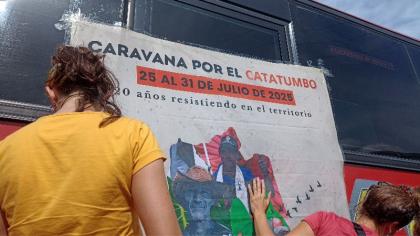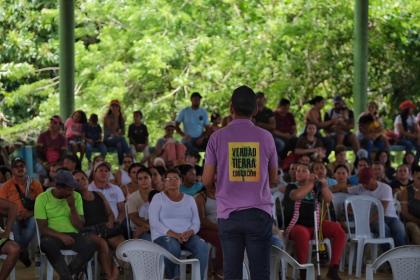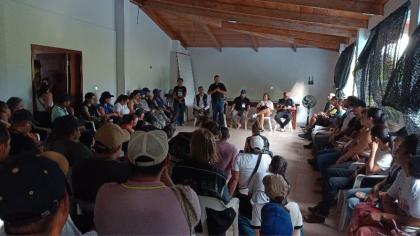
It is with the strength of peasant dignity and the support of social organizations from all over the country that Catatumbo is preparing to receive an international Humanitarian Caravan, which will travel through its territories from July 25th to 31st. This initiative, led by the network Red de Hermandad y Solidaridad con Colombia - RedHer, will allow more than 100 caravanists to learn about and make visible the multiple human rights and International Humanitarian Law violations faced by their communities, as well as demand real guarantees from the Colombian State for a dignified life.
The itinerary will begin in the city of Ocaña and pass through emblematic municipalities such as Convención, Teorama and El Tarra, territories historically affected by the armed conflict, state neglect and the presence of various armed actors. For seven days, the Caravan will hear first-hand testimonies from social leaders, peasant organizations, youth and women who, despite the war, continue to resist and build peace initiatives.
This is the second Humanitarian Caravan visiting Catatumbo. The first one took place in August and September of 2004, at a critical moment of paramilitary consolidation. That caravan broke the siege of fear and allowed the development of the meeting "Integration, Life and Territory", in which more than 400 delegates from local community councils (Juntas de Acción Comunal, JAC) and federations of these councils (Asociaciones de JAC) participated. This event was the starting point for the creation of the Committee for Catatumbo Social Integration (CISCA), one of the organizational expressions of the Catatumbo region.

Twenty years later, in a context of pressure, stigmatization and systematic accusations against social and community leaders, this second caravan will take place under the slogan: "20 years resisting in the territory". The Caravan will be made up of more than 100 national and international participants, including delegates from foreign organizations, peasant communities, social organizations, human rights defenders, media, in addition to the accompaniment of the verification mechanism of the United Nations, the Ombudsman's Office, the Diocese of Ocaña and the MAPP OAS. The main objective is to collect the multiple allegations of human rights violations, breaches of international humanitarian law and structural violence resulting from state neglect, that continue to seriously affect the region. These denunciations will be condensed into a report that will be presented to national and international institutions and organizations.
In a context of increasing militarization, silent expansion of paramilitarism and criminalization of social work, the Caravan represents an urgent action for the communities. In Catatumbo, exercising leadership or defending the territory continues to be grounds for stigmatization and persecution. "To speak out here and now is to put a tombstone on our backs. To move around the region, to make inquiries to the governor's office or municipal mayors' offices, as well as to go to Ocaña to sell our products and stock up on supplies has become a high risk for us, and especially for the leaders," say social leaders who have been victims of threats and profiling.
In addition to collecting denunciations, the Humanitarian Caravan will also follow up on the "State of Internal Commotion Decree” and verify the real progress of the "Social Pact for the Territorial Transformation of Catatumbo". This pact, assumed as a commitment by the National Government, seeks to structurally transform living conditions in the region and was built through a participatory process that included Asociaciones de JAC, social organizations, producer associations, women's processes, youth, and indigenous Barí people, as well as local authorities and other actors. It is one of the most comprehensive public policy formulation exercises between the State and the communities of Catatumbo.
A leader from the region points out that peace is when we talk about social justice, sovereignty and real participation in the transformation of our realities; a peace built from below, that dignifies peasant life and protects the territory. It is not only the peace of the people, but also the peace of the land, of the river, of communities and families. It is a call to move from governments of war to governments for life, from extreme wealth to social justice, from paramilitarism to democracy, from the doctrine of national security to the defense of dignity, from lies to truth, from corruption to honesty, from impunity to justice, and from dispossession to the guarantee of non-repetition.

The convening organizations make an urgent call to the media, state institutions and international organizations to make this initiative visible and break the stigmatization that weighs on Catatumbo. The struggle for life, territory and social justice needs allies.